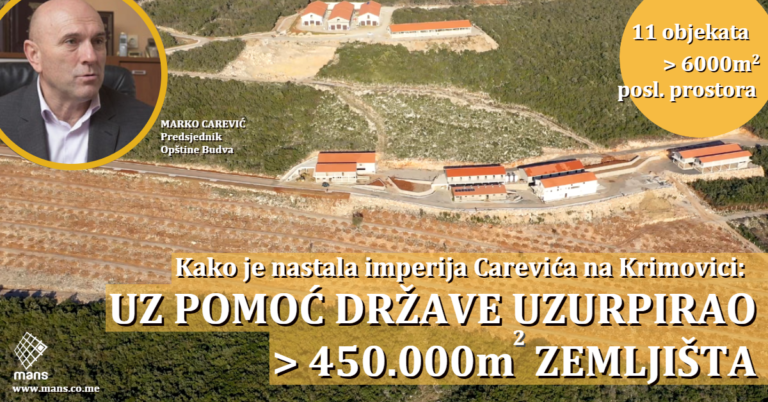Since 2015, when he started implementing his plan to usurp almost half a million square meters of the state-owned land in Krimovica, the President of the Municipality of Budva, Marko Carević, has had the continuous support of state institutions, which are now joined by the Special State Prosecutor’s Office (SSPO).
In a letter sent to Carević last week, Special Prosecutor Veljko Rutović informed the mayor of Budva that SSPO was not competent for the case formed regarding the usurpation of state property, and that it had been forwarded to the Basic State Prosecutor’s Office in Kotor.
The usurpation of nearly half a million square meters of the state-owned plots, and the mass illegal construction that has been going on for five years, could not have been done without the active support of state institutions, which SSPO obviously did not take into account or examine in more detail.
The fact that Carević in the first place usurped the state-owned land for years without any consequences, then built illegal facilities on it and finally reaped profits, should interest SSPO, bearing in mind the value of the property confiscated from the state. This also refers to the fact that in the case of Marko Carević, it was quite certain, accidentally or intentionally, that the institutions of the system in charge of applying the law equally to everyone, have completely failed.
This primarily refers to the Ministry of Finance, which manages state property and which, until the publication of the MANS’ investigative story, did little to prevent Carević from illegally occupying the state-owned plots. The same applies to the competent Ministry of Sustainable Development and Tourism and its inspection, which for years has watched illegal facilities being built in Krimovica, even though illegal construction has long been a criminal offense.
The Police Directorate and the State Prosecutor’s Office had the same approach, although, even at the beginning of Carević’s illegal venture, they had to react ex officio, without waiting for the information to reach the public.
That Carević had the full support of the state for his work in Krimovica is also shown by the fact that the Ministry of Agriculture enabled the registration of his farm on the state-owned land, but also state subsidies and millions worth of loans through the Investment and Development Fund (IDF).
These are the facts that SSPO obviously ignored when making the decision not to deal with organized crime and corruption, without questioning the nature of Carević’s relations with the heads of institutions whose non-acting and tacit approval enabled him to preserve his illegal empire in Krimovica.
Finally, the fact that Marko Carević has a special status when it comes to violation of the law is shown by the meeting held in the Government of Montenegro in mid-June this year, during which the Deputy Prime Minister and Minister of Agriculture Milutin Simović and the Minister of Finance Darko Radunović “presented the possibilities of legalization and valorisation” of the state-owned land in Krimovica.
Although the public was never informed of the outcome of that meeting, and what and under what conditions Carević agreed with the ministers, we believe that SSPO has more than enough so-called grounds for suspicion to investigate whether the official meeting was preceded by Carević’s less official contacts which enabled him to usurp the state-owned land for years without any criminal liability.
It is not clear why SSPO does not want to do that, but it is quite clear that Carević has enormous and very specific benefits from such decisions of the State Prosecutor’s Office. After SSPO rejected the criminal report in the case of municipal tenders with the company “Asfalt beton gradnja”, without any basis and explanation, there is very little room for doubt that this is the case of “laundering” of Marko Carević’s business biography. This behaviour of the SSPO has very concrete consequences for the public interest and the state budget, as well as for the rule of law and the feeling of citizens that the law is equal for all.
Dejan Milovac
Investigative centre



